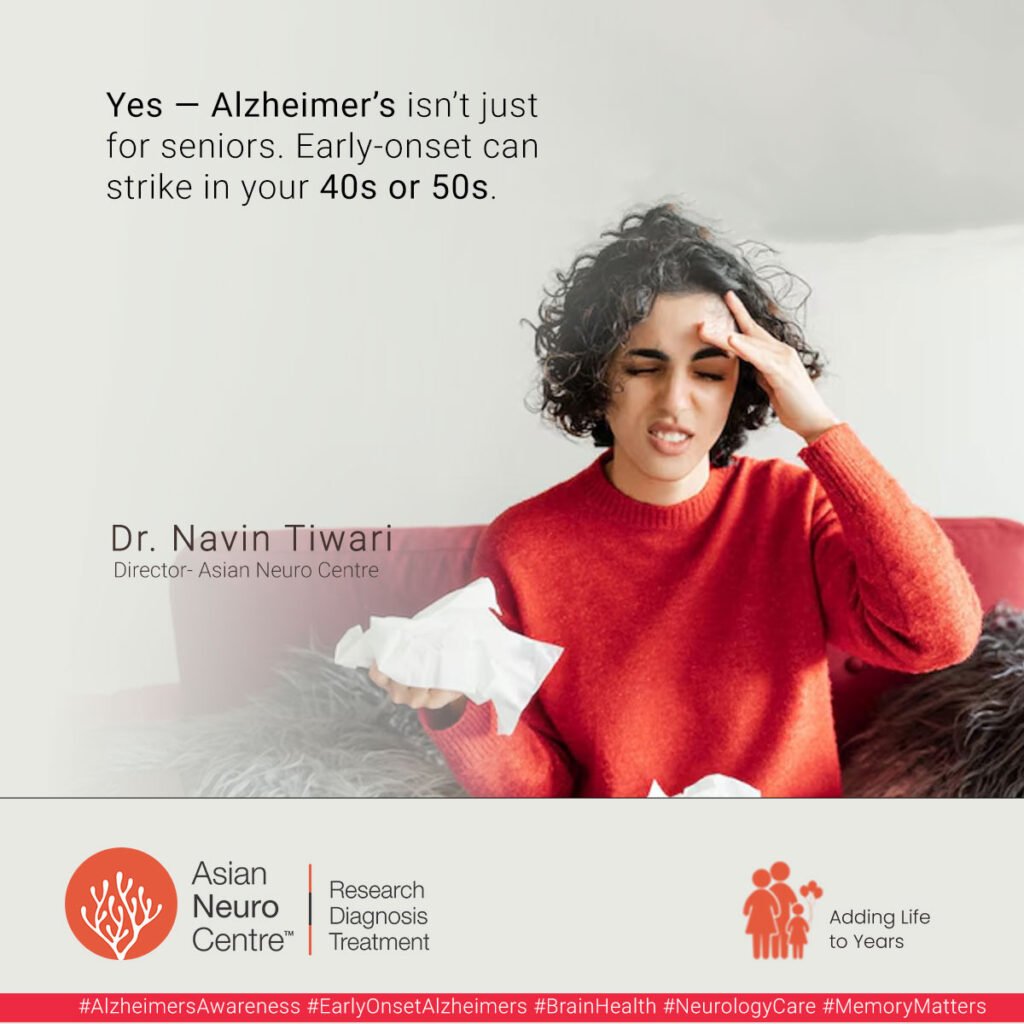- Have any questions?
- 911 12345 29
- info@asianneurocentre.com
Is It Possible to Have Alzheimer’s at an Early Age?
What are Stroke Risk Factors?
August 8, 2025अल्जाइमर से शरीर का कौन-कौन से अंग प्रभावित होता है?
August 30, 2025Alzheimer’s is viewed as a disease that targets advanced age adults and typically at the age of 65 years. Nonetheless, there are also cases when the disease can be acquired by younger people.
When Alzheimer’s occurs before the age of 65, it is known as Early-Onset Alzheimer’s Disease (EOAD). It may not be very common, but it can have a very far-reaching consequence on a person’s career, relationships, and even their quality of life.
What is Alzheimer’s Disease?
Alzheimer’s is a generalized ailment associated with memory, thought, and behavior. It happens because of irregular alterations in the brain tissue and includes, for example, the accumulation of amyloid plaques and tau tangles, causing brain cells to die.
The condition is slow in progressing symptoms and begins with mild memory loss and head to serious radials where people are in need of constant attention choices.

What then is Early-Onset Alzheimer?
Early-onset Alzheimer’s is the form of the disease whose symptoms manifest themselves before the age of 65, in some cases as soon as the 30s or 40s.
Although it is a relatively rare form of Alzheimer’s (5-10 percent of all cases), it can have devastating effects as it often affects people in the years of their initial career and family planning.
Risk Factors and Causes of Alzheimer‘s
The etiology of early-onset Alzheimer’s is not completely known, yet there are risk factors that make one more susceptible to it.
- Genetic Mutations: APP, PSEN1, and PSEN2 are some of the genes associated with Alzheimer’s that are profoundly connected to early hereditary variants of Alzheimer’s.
- Family History: A family history of Alzheimer’s is a risk factor considered to be elevated by the close relatives.
- Lifestyle and Health Conditions: An unhealthy cardiovascular system, brain trauma, smoking, or untreated diabetes might be involved.
Symptoms of Alzheimer
Signs are similar to late-onset Alzheimer’s but could cut across the season. Such common symptoms are:
- You cannot remember things that have just happened or what has been said.
- Difficulty in carrying on with usual work or at home.
- Difficulty in solving a problem, planning, or decision-making.
- Time, place, or direction confusion.
- Depression, irritability, or withdrawal can cause changes in personality and mood.
The reason is that younger individuals, in general, are supposed to think clearly, therefore, these symptoms will be mistaken as being stressed or even depressed or such that relates to the psychology of the individual.
Alzheimer’s Diagnosis and Treatment
Early-onset Alzheimer’s is a difficult diagnosis to make. Physicians can make use of:
- Cognitive tests to determine memory and thinking.
- Brain imaging (MRI or PET scans) to detect structural changes.
- Genetic screening of family sections with a high rate of disease history.
Although there is so far no cure, medications such as cholinesterase inhibitors and memantine may be used to treat symptoms. Progression can also be slowed by lifestyle modifications, including exercise, mental stimulation, a healthy diet, and socialization.
The Daily Life of Early-Onset Alzheimer’s
The early onset of the diagnosis can impact work, money, and family. Planning for the future, counseling, and support groups are important. Beloved people perform a vital role in the assistance and emotional support.
Conclusion
Yes, there can be early Alzheimer’s, but it is most unusual. The case of early-onset Alzheimer’s is special since it interrupts careers, family, and independence at the most active period of life.
Knowledge about the symptoms, early diagnosis, and supportive care can go a long way in the treatment of the condition. Additional research and medical success give hope of improved treatment and eventually, a cure.
Dr. Navin Tiwari
Consulting Neurologist
